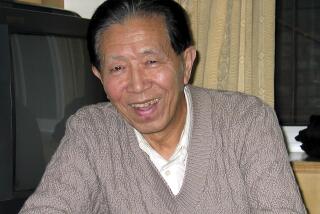1936 Incident Still Echoes in China Rivalry
- Share via
TAIPEI, Taiwan — Fifty years ago today, in one of the most dramatic episodes in 20th-Century Chinese history, a young Chinese army marshal and his troops stunned the world by kidnaping Gen. Chiang Kai-shek, then the president of Nationalist China.
Marshal Chang Hsueh-liang held the Chinese leader hostage for two weeks in the city of Xian, demanding that he stop the civil war against the Communists and help unite China to repel the Ja1885433445agreeing to the marshal’s conditions.
Afterwards, Chang loyally followed the general back to the Nationalist capital of Nanjing, where he was quickly placed under house arrest. Even now, after half a century, foreigners are still not permitted to meet alone with him at his home in Taiwan, and he is still reportedly kept under watch by Nationalist agents.
Chang has become a hero on the Chinese mainland. Today, throughout China, the Communist Party will sponsor memorial celebrations and issue new books about the 1936 “Xian incident,” which is officially credited with bringing about the true start of the United Front of Chinese Nationalists and Communists against the Japanese.
Here on Taiwan, it is a different story. The army mutiny led by Chang is often regarded as an important turning point in the fortunes of the Chinese Communist Party, and Chang himself is officially treated as a non-person.
When Chiang’s Nationalist forces, defeated by the Communists, fled from the mainland to Taiwan in 1949, they brought Chang with them. “The young marshal,” as he is known to millions of Chinese, is now 88 years old and lives in a suburb of Taipei.
Several Taiwan sources report that after half a century, Chang still remains under a mild form of surveillance--free to go out from his home but always accompanied or followed by a bodyguard.
A spokesman for the Taiwan government said that Chang is not under house arrest, but he turned down repeated requests from several foreign correspondents to speak with him.
“He is free. He has gradually become free,” said Charles Chen of the Taiwan government information office. “He’s become a very private person. We can’t force him to meet with reporters. He regrets that he cannot see you.”
Asked about Chang’s legal status, the spokesman replied, “Maybe there was no legal case against him.” Chang’s problem, he said, “was political, not legal.”
Sentenced, Pardoned
Actually, Chang was sentenced to 10 years in prison in 1937. He was then pardoned and turned over to the custody of the chairman of the Nationalist regime’s Military Affairs Commission, who happened to be Chiang Kai-shek himself.
Chen, the Taiwan government spokesman, and other sources in Taipei said that while on Taiwan, Chang joined a prayer group that included Chiang. “They became friends,” Chen asserted. Chiang died in 1975. His son, Chiang Ching-kuo, is now Taiwan’s president and Nationalist Party leader.
Witnesses with no connection to Taiwan’s Kuomintang (Nationalist Party) regime say Chang has been seen in public occasionally but always with someone nearby keeping an eye on him.
“I saw him in a restaurant last year,” said Antonio Chiang, an editor of several magazines for the Kuomintang’s political opposition. “He was dressed like a gentleman. Of course, he had a bodyguard. They say he is carefully protected, but he doesn’t care any more.”
In fact, the editor said, on one occasion when a Taiwan security official in charge of keeping tabs on Chang was asked to retire, the marshal intervened with the regime to keep the security man on the job.
Son of Manchurian Warlord
Chang Hsueh-liang is the son of a Manchurian warlord, Chang Tso-lin, who was killed by the Japanese in 1928. The young marshal took over his father’s powerful Manchurian army.
Chang originally threw important support to Chiang’s Nationalist regime, but he became increasingly disturbed as the general pursued his “bandit suppression” campaigns against the Communists while the Japanese advanced through northern China.
In December, 1936, Chiang went to Xian (pronounced Shee Ahn and once spelled Sian) and ordered Chang, whose official title was deputy commander in chief of bandit suppression, to attack the Communists once again.
Early on the morning of Dec. 12, Chang and army leaders working with him countered by arresting the president. Chang then sent a telegram to Nanjing and the nation, calling for an end to the civil war and for armed resistance against the Japanese.
Chou En-lai Arrived
Several leaders of the Nationalist regime, including Madame Chiang Kai-shek, flew to Xian. Communist Party leaders Chou En-lai and Ye Jianying also rushed there from the Red Army’s base areas in northern Shaanxi province. Xian, 550 miles southwest of Peking, is the province’s capital.
There ensued a round of negotiations in which the Communist Party supported the release of Chiang and a common effort under his leadership against Japan. Chiang maintained that this was exactly what he had always wanted.
“All the political reforms the Xian leaders espoused had long been in the mind of the generalissimo himself,” Madame Chiang wrote in an essay, “Xian: A Coup d’Etat,” which is still the official version handed out today by Taiwan’s government information office.
From its position of strength on the mainland, China’s Communist regime is now once again making peace overtures towards its old Nationalist adversaries.
This week, China announced that the place where the general was captured in Xian will be renamed. It used to be bluntly called “the Pavilion Where Chiang Was Captured.” From now on, authorities said, it will be known more gently as “the Military Remonstration Pavilion.”
More to Read
Sign up for Essential California
The most important California stories and recommendations in your inbox every morning.
You may occasionally receive promotional content from the Los Angeles Times.











